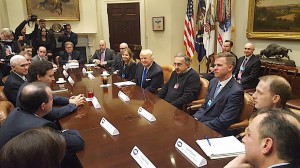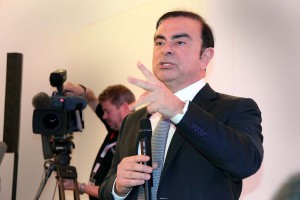
President Donald Trump, center, met with the CEOs of Ford, General Motors and Fiat Chrysler to discuss a variety of issues, including fuel economy rules.
President Donald Trump is expected to visit the Detroit area Wednesday and is expected to come bearing gifts for the Motor City’s automakers in the form of lower fuel-economy standards.
The move comes as automakers have been lobbying the new administration to roll back the tougher corporate average fuel economy standards set down by Obama administration just prior to Trump’s inauguration in January.
The plan has not been confirmed officially by the Trump White House. However, the President and his selection to head the Environmental Protection, Scott Pruitt, have zeroed in fuel-economy regulations, saying they need to be revised.
Trump also has apparently summoned the top executives of General Motors, Ford and Fiat Chrysler to meet with him at the new autonomous vehicle testing center under development at what was once the site of Willow Run Bomber plant in Ypsilanti, one of Detroit’s western suburbs.
White House spokesman Sean Spicer said the trip to Michigan is focused on “job creation and automobile manufacturing … highlighting the need to eliminate burdensome regulations that needlessly hinder meaningful job growth.”
(Feds may soon roll back fuel economy standards. Click Here for the story.)

Carlos Ghosn, Renault-Nissan chief, said a rollback U.S. CAFE standards will not change the company's product plans.
Officials from the United Auto Workers apparently also have been invited to the event with Trump, according to at least one report.
Trump’s visit comes on the heels of GM’s announcement that it plans to layoff about 1,100 workers at plant in Delta Township outside of Lansing, Michigan, and on the eve of the layoffs of another 1,000 workers at GM’s “Poletown” assembly plant in Detroit. The layoffs at the Detroit-Hamtramck plant were originally announced in December.
Initially, at least, the Trump administration will likely focus on altering the rules on fuel economy and emissions affecting vehicles that will appear in showrooms in the years 2022 through 2025.
Automakers have complained the rules set out by the Obama EPA will be too expensive to meet. The mandates also could wind up reducing employment in the auto industry because prices increases necessary to support new technology would reduce consumer demand for new vehicles, according to a study by Center for Automotive Research in Ann Arbor, Michigan.
(Auto CEOs ask Trump for a CAFE break. Click Here for the story.)
The changes are bound to draw intense criticism from consumer groups and environmentalists, who view the Corporate Average Fuel Economy rules as critical to protecting public health and promoting energy conservation.
Consumers Union, publisher of Consumer Reports, said in a report released earlier this month that car buyers are getting better fuel efficiency at a lower cost, while vehicle prices have remained steady over the past 20 years.
“In fact, had it not been for fuel economy standards, the average consumer would be paying $523 more in annual fuel spending,” said Shannon Baker-Branstetter, policy counsel for Consumers Union.
“Multiplied by millions of new cars each year, that’s billions of dollars going back into our economy, and supporting thousands of jobs. Fuel economy standards are a win-win for everyone,” said Baker-Branstetter.”
(For more on the EPA’s mileage decision, Click Here.)
But the Trump administration cannot scrap the Corporate Average Fuel Economy mandate completely without approval from Congress, which originally approved the fuel economy standards in the 1970s and has revised them throughout the years despite repeated calls to junk the rules completely from a variety of conservative pundits.
